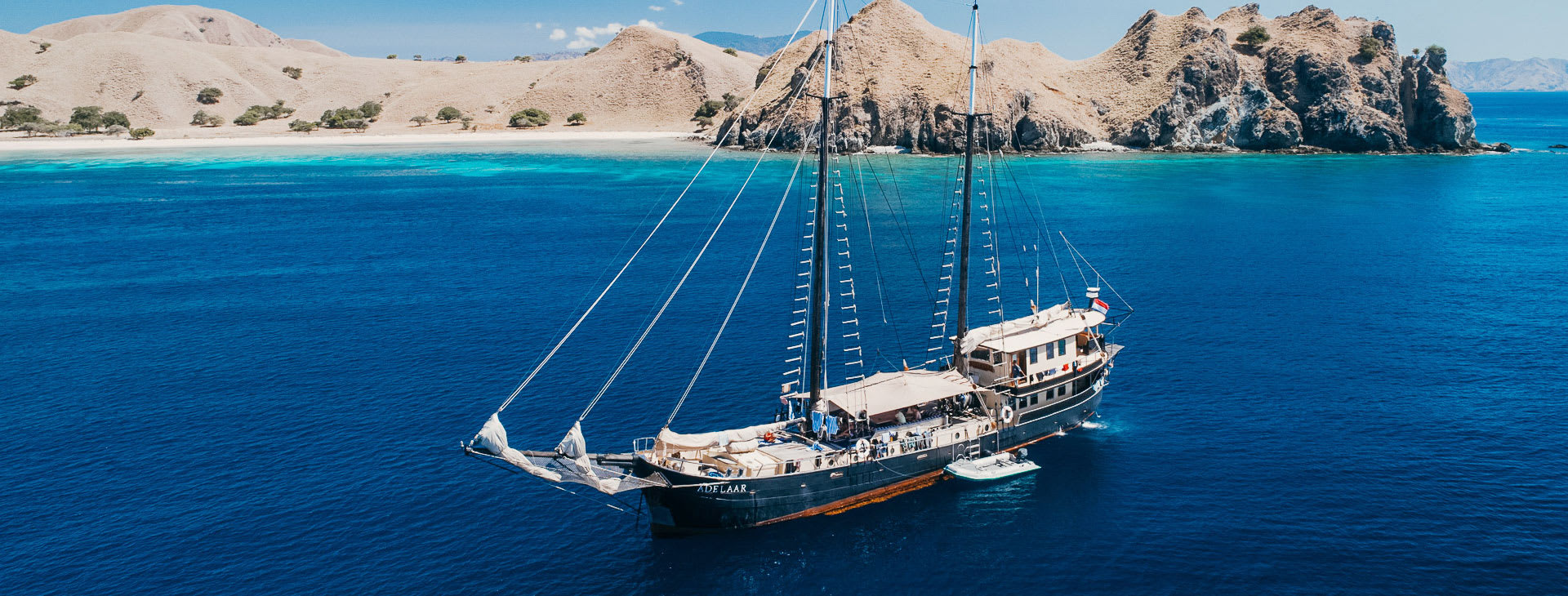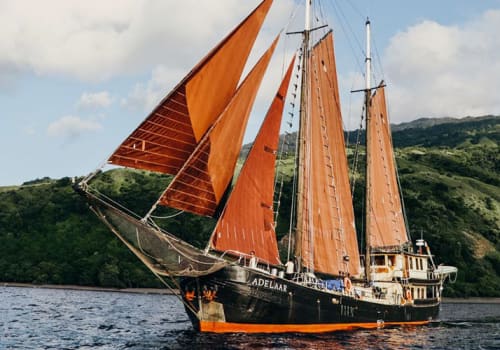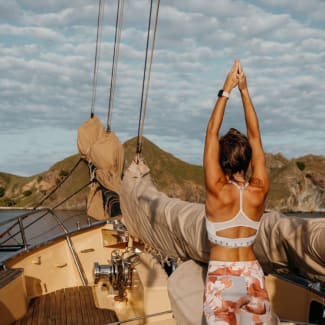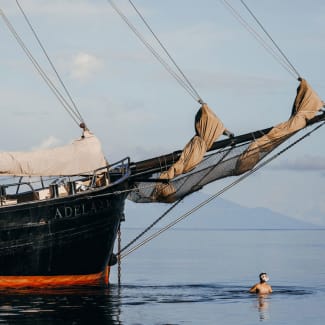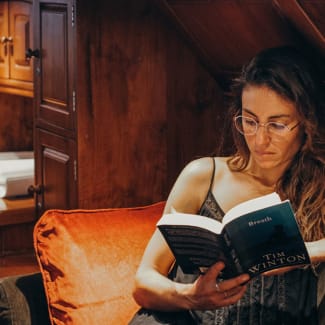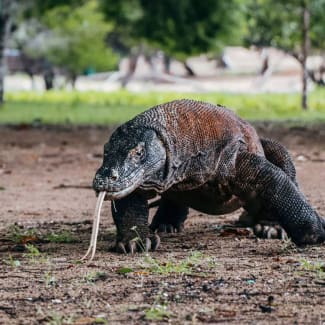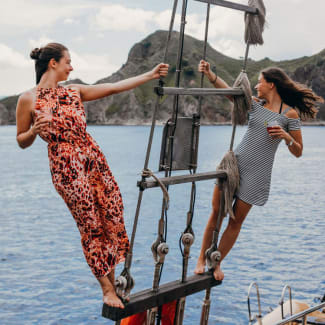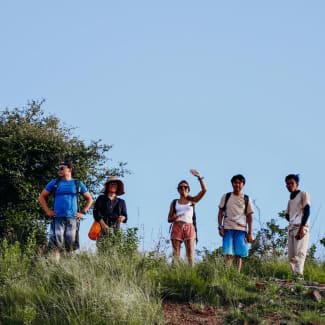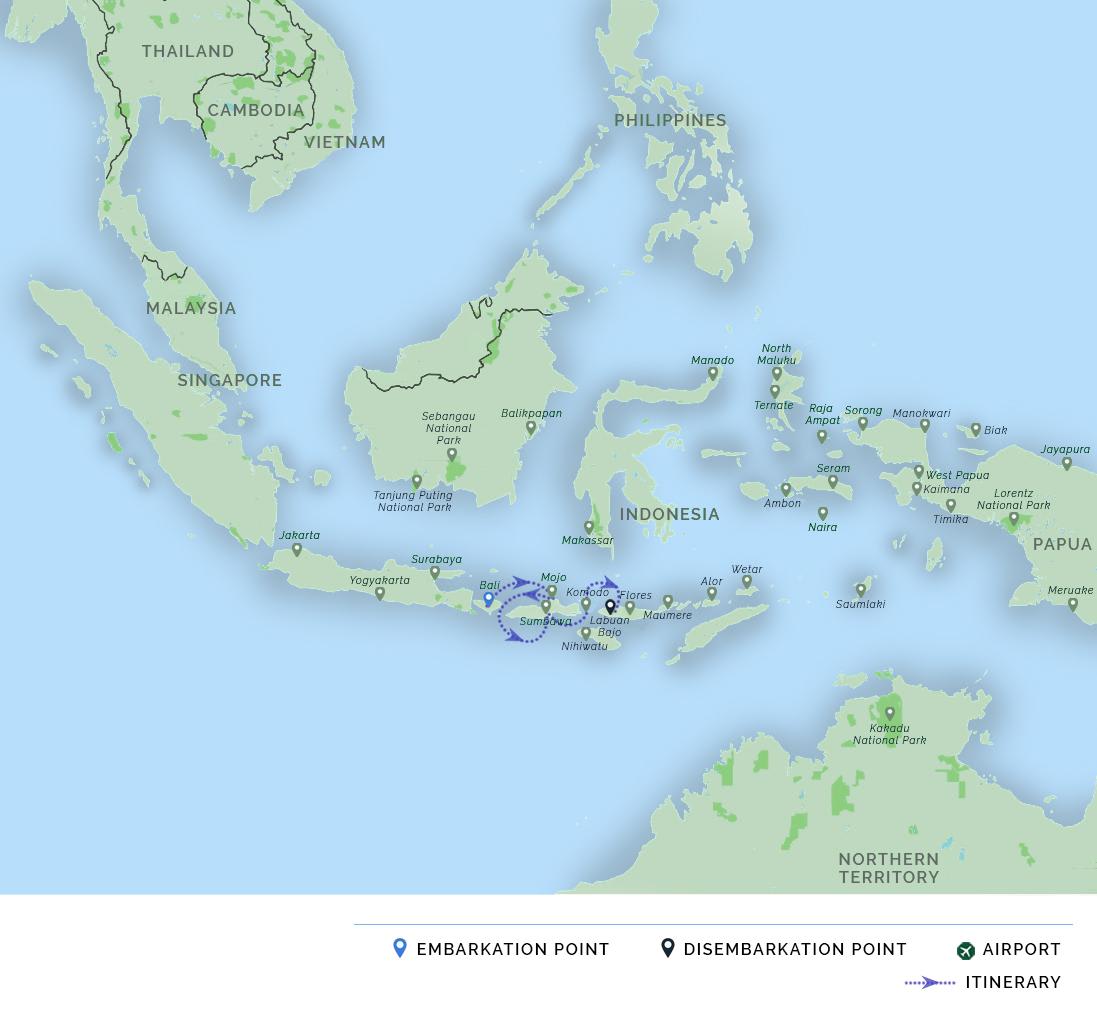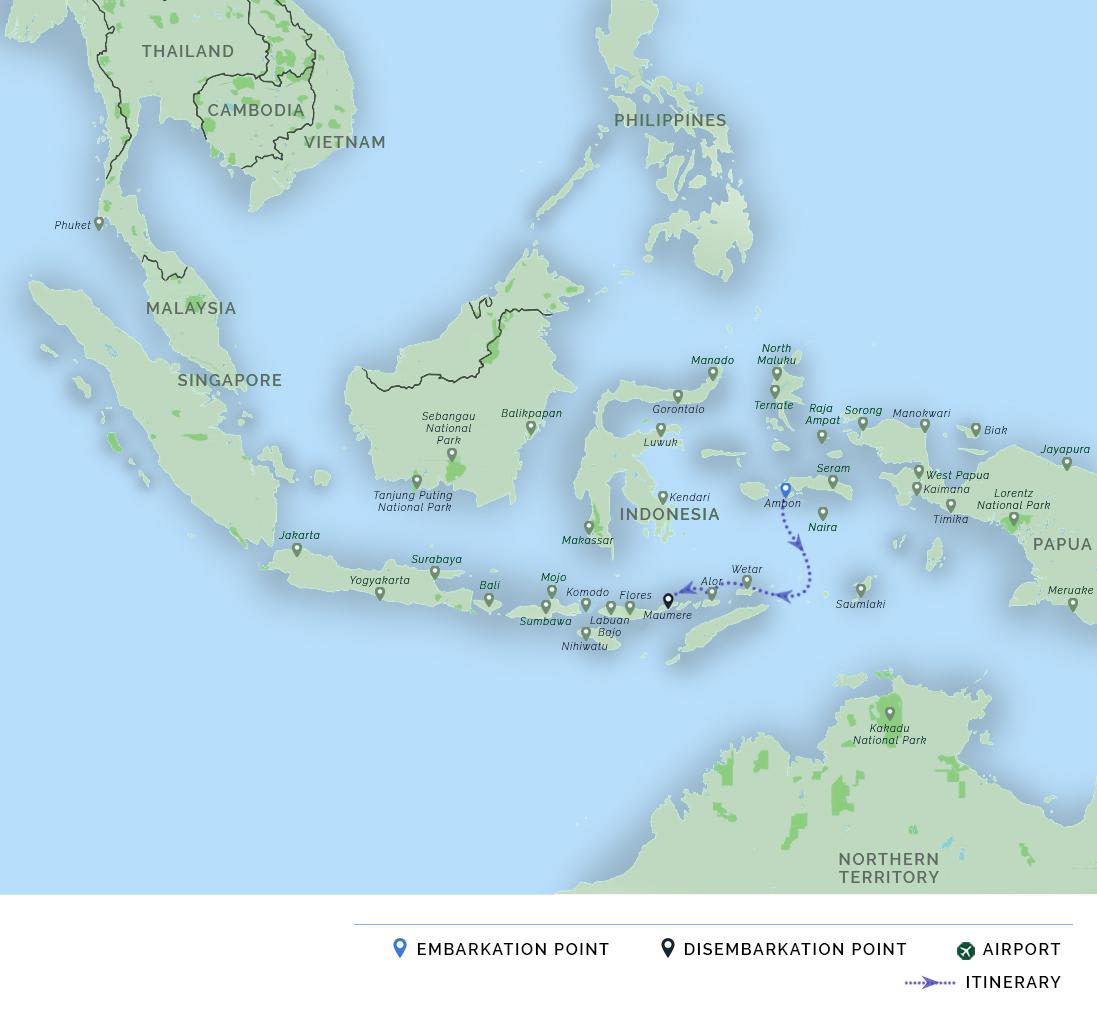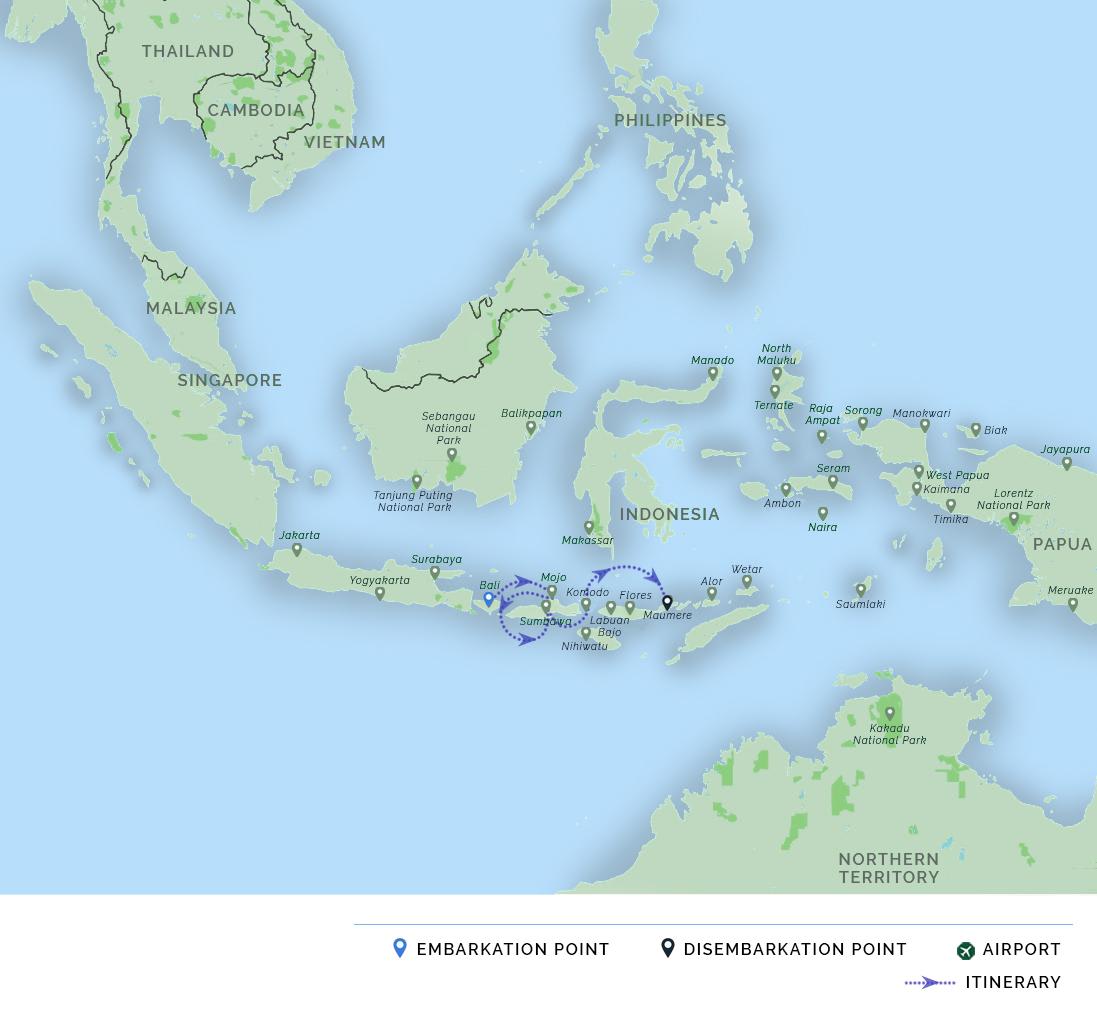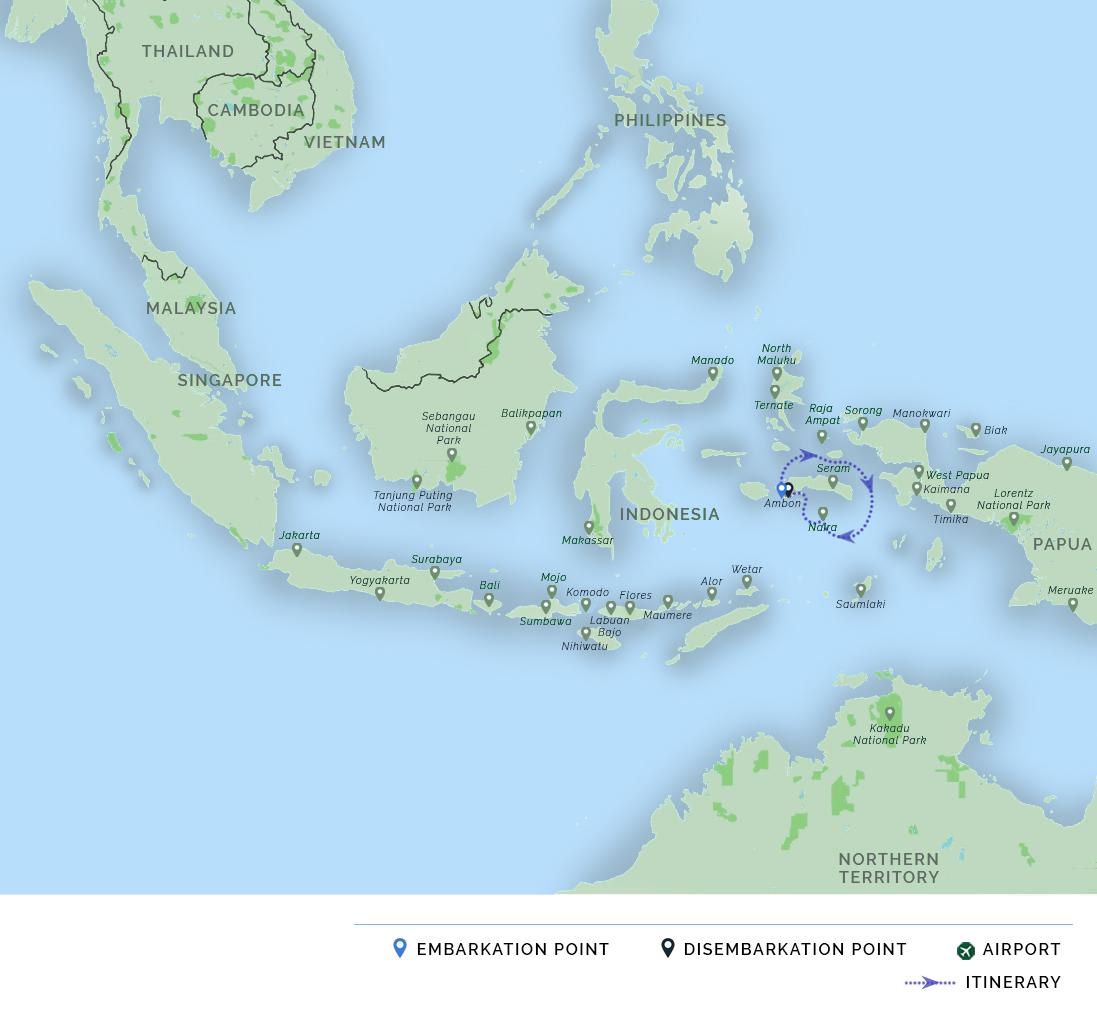Overview
The 128-ft Adelaar Liveaboard is a beautiful old Dutch Schooner with an extraordinary history of adventure and global circumnavigation spanning more than a century. Built in Holland in 1902, she has been sailing the Indonesian archipelago since 1994. In 2011, she was given an exquisite upgrade befitting a classic super-yacht. Accommodating just eight guests for dive cruises coupled with land excursions, she blends old-world romance and power with impeccable modern standards.
Sleeping On Board
Adelaar’s four splendid teak and marble staterooms are the epitome of quality and supreme comfort. All are located on the Lower Deck, and all are air-conditioned with state-of-the-art, on-demand movie and music entertainment systems. The spacious Master Stateroom is fitted with generously high ceilings, a queen-size bed, sofa and two desks, as well as abundant closets and drawer space.
Two of the other staterooms (numbered 2 & 3) include desks, double beds and convertible couches should you prefer twin occupancy, while the third (number 4) costs a little less, featuring a slightly smaller bed and lacks the couch and desk. Each en-suite bathroom is equipped with a JETS vacuum toilet, Kohler wash basin and Grohe hot water shower. Branded amenities include calming shampoo, conditioner, and body wash.
Dining On Board
On-board cuisine combines the flavors of traditional Indonesian favorites with classic Western dishes, prepared on board from the freshest ingredients. The air-conditioned dining room has large windows, which provide panoramic views of Indonesia’s vivid landscapes. Sometimes, meals are served in the salon or, weather permitting, up on the deck under the stars.
Relaxing On Board
A large table and long comfortable couches situated under an expansive sun awning, make the Main Deck the ultimate spot for gazing at the passing scenery while kicking back after diving, or reading a good book from the ship’s well-stocked library selection. The Forward Deck is fitted with comfortable cushions for relaxing and sunbathing. The cozy main salon is located below deck; here, you can chill out on the sofa, challenge someone to a game of chess at the games table, or listen to music via the ship’s audio streaming system.
The Team
Adelaar’s crew consists of 11 Indonesian seamen, a Western Cruise Manager / PADI Dive Instructor, and a Divemaster. They all are all highly experienced, with a passion for Indonesia and the sea. These considerate, friendly people work tirelessly to ensure that the cruises run smoothly. The captain and crew will welcome you at the upper deck bridge area where you can observe them at work and take a turn at navigating or steering the ship.
Activities
Besides scuba diving, you can enjoy snorkeling, island excursions to meet the local people, bird watching and wildlife spotting, trekking, sea kayaking, stand-up paddleboarding, wakeboarding and waterskiing, coupled with dramatic scenery.
An Adelaar Cruise will take you to the best dive sites and places to see within the Komodo National Park, the Alors, the Forgotten Islands, and the Banda Sea. Several times a year, guests will get the chance to learn about manta rays and whale sharks on special marine conservation cruises.
Itineraries & Prices
All itineraries are subject to change due to seasonal weather conditions (and resultant variations in river and tributary water levels) affecting accessibility to locations. Thus navigation routes, times and excursions may need to be modified at the cruise captain’s or your guide's discretion.
Embarkation
AM: The meeting point will be at the Main Passenger Jetty in Serangan Harbor at 8:30 AM, where our crew are standing by to welcome you.
PM: As soon as everyone is aboard, we depart Serangan and move along the coastline of Bali, cruising overnight to Satonda Island. We hope for a magnificent sunset over Bali’s majestic Mt Agung.
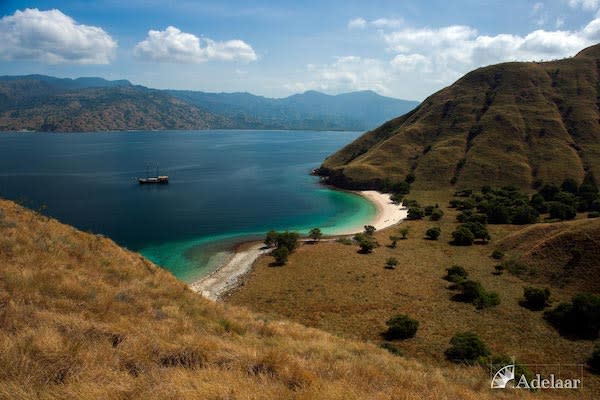
Moyo & Satonda Islands
AM: Two morning dives are scheduled at Pulau Moyo along the fringing reef outside the main village.
PM: Arrival in Satonda will be late afternoon with one dive along a sloping reef, with a sandy bottom and with many coral outcroppings. As the sunsets, the sky fills with bats heading to the mainland for their nightly forage. We prepare for the first night dive of the trip, and afterwards will travel through the night to Sangeang.
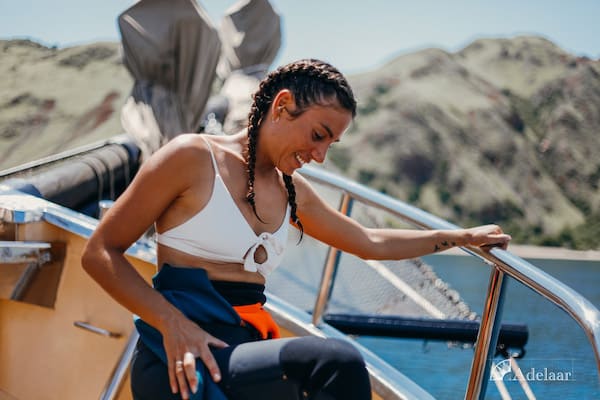
Sangeang Volcano
AM: Sangeang volcano, whose most recent eruption was in 2014, rises on the horizon. As we approach the island at sunrise, be prepared for an occasional puff of smoke from the still active crater.
PM: The black sandy bottom of this site makes for spectacular diving. In places, a steady stream of gaseous sulfur bubbles up from the sand towards the surface, creating the feeling of an underwater jacuzzi! We will anchor for the night here, with a night dive planned.
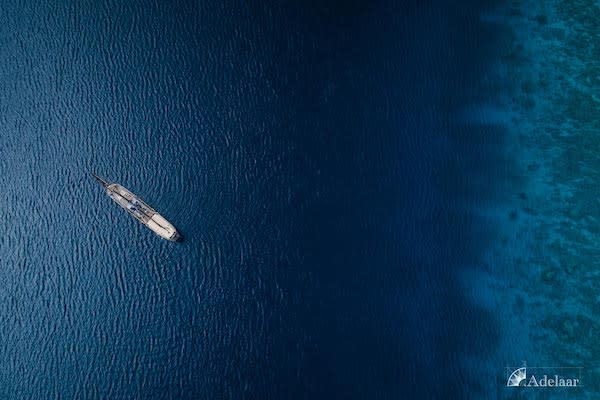
North Komodo National Park
AM: We are up early today for a glimpse of the sunrise as we arrive at Gili Lawa Laut, in the northern area of Komodo National Park. The park is located in the region known as Wallacea, denoting the overlapping of Australian and Asian biogeographical areas. This overlap ensures an interesting mix of bird species. There is a splendid assortment of dive sites just outside this picturesque bay.
PM: In the late afternoon, we move to the outside edge of Komodo Bay and prepare for our night dive.
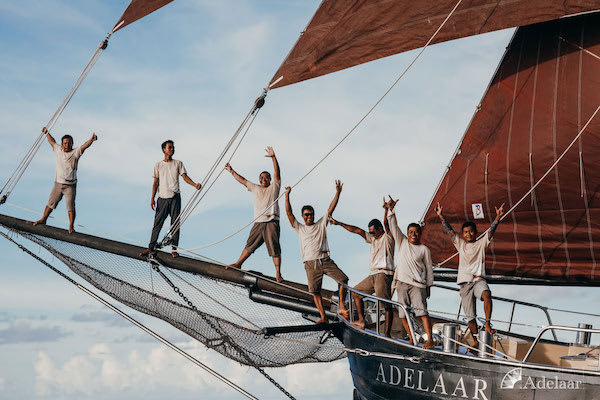
Komodo Island & Lehok Sera
AM: Dragons! We go ashore at 7:00 AM for a ranger guided hike into the interior of Komodo Island, to look for Komodo dragons. This UNESCO World Heritage site is the only natural habitat of these giant monitor lizards. The area was designated as one of the New 7 Wonders of Nature in 1991.
PM: Once safely back aboard, we travel south for a late morning dive along the coast of Komodo. At dusk, we dive Lehok Sera to search for the elusive mandarin fish.
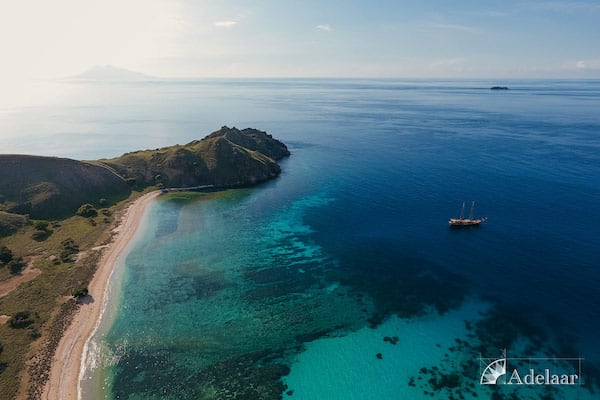
South Komodo National Park
AM: An early morning departure is planned, as we head to the extreme southern end of Komodo to Manta Alley. This area typically has much cooler temperatures with nutrient rich waters, perfect for Mantas!
PM: We enjoy lunch as the boat moves to southern Rinca to an area known as Nusa Kode. With the towering cliff walls surrounding all sides, the landscape in this remote area, is breathtaking. Between dives, we board the dinghy and head towards the shore, to get up close to the resident dragon population. After the sun sets, we prepare for a night dive, and a late dinner.
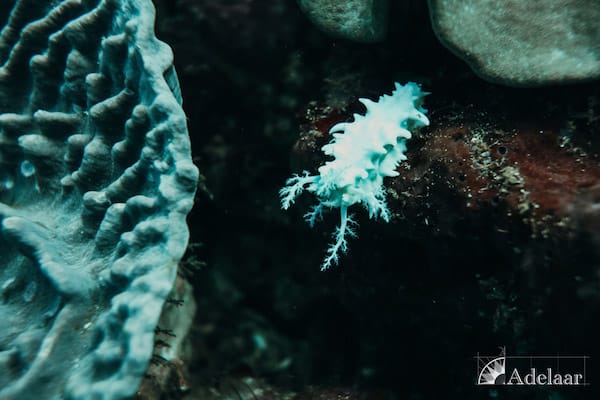
South Rinca
AM: There are two dives planned for this area, one of which will be the famous ‘macro temple” of Cannibal Rock, a photographer's dream come true. From here we journey north to Padar Island for our afternoon dive.
PM: Just before sunset, we go ashore and hike across a beautiful crescent bay, to witness a spectacular sunset. Alternately, for those who prefer to be underwater, a night dive is planned.
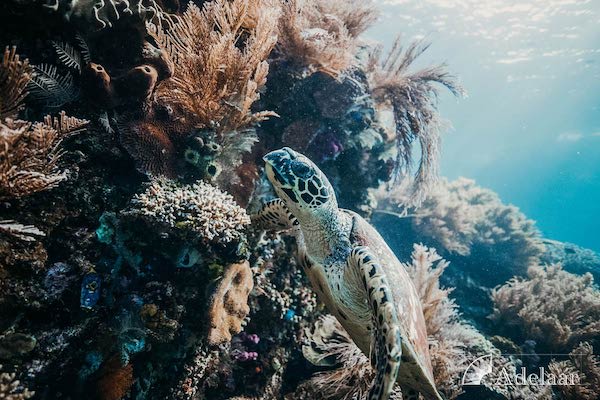
Padar & North Rinca
AM: We depart early from Padar and enter the central park area, also known as ‘current city’. This area of the park is subjected to the strong tidal currents that run through the Lintah Strait, bringing with them, plenty of marine life. These currents make for lots of action and exhilarating drift dives. Mantas are often seen in these parts.
PM: In the late afternoon, we make our way north toward Wainilu and prepare for a night dive.

Central Komodo
AM: We spend the day diving around the center and northern boundary of the Park off the uninhabited islands of Gili Lawa Laut and Gili Lawa Darat.
PM: We anchor in a quiet bay for the night, and plan a night dive.
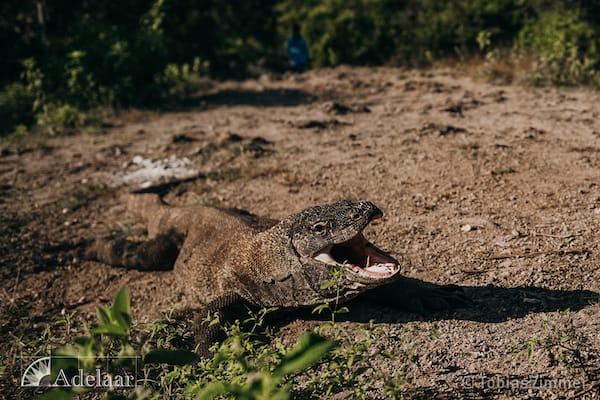
North Komodo
AM: We enjoy the last dives of the trip around the Northern boundary of the Park and the islands of Sebayor.
PM: Be aware of your “no fly time” and plan your last dive to stay within safe flight limits.
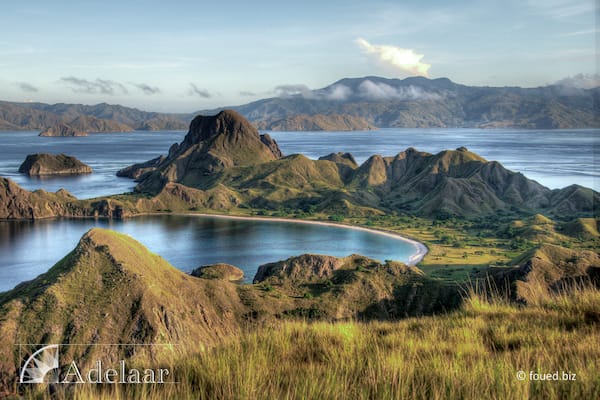
Disembarkation
We arrive in Labuan Bajo in the morning by 7:00 AM. Disembark after breakfast for your onward journey.
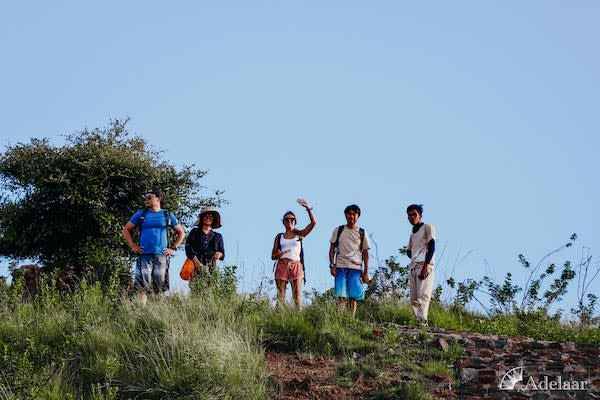
Embarkation
After boarding Adelaar in Ambon, you will enjoy your first day on board whilst cruising straight into the heart of the blue Banda Sea.
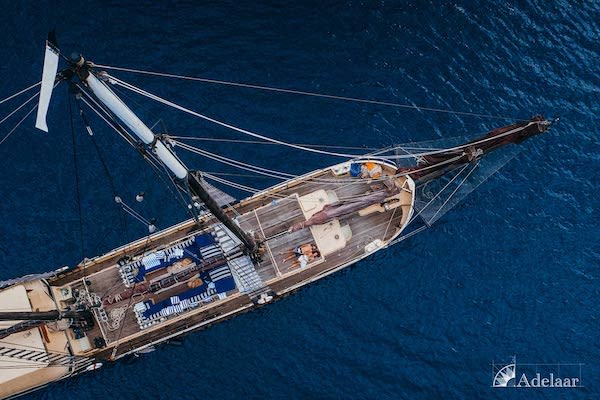
Lucipara Penyu Archipelago
The Lucipara archipelago consists of several uninhabited low profile sandy islands with lush tropical vegetation. The islands themselves are inaccessible, protected by very shallow fringing reefs that extend several hundred meters from the islands themselves. At the edge these huge coral shallows plunge steeply into the typically crystal-clear abyss of the Banda Sea. Diving these remote locations has by definition an exploratory character-their location in the middle of the deep sea with no other islands around is very inviting for passing pelagics to hang around, thus increasing chances of close encounters between divers and bigger species such as tunas, rainbow runners, thresher sharks, silky sharks or hammerhead sharks.
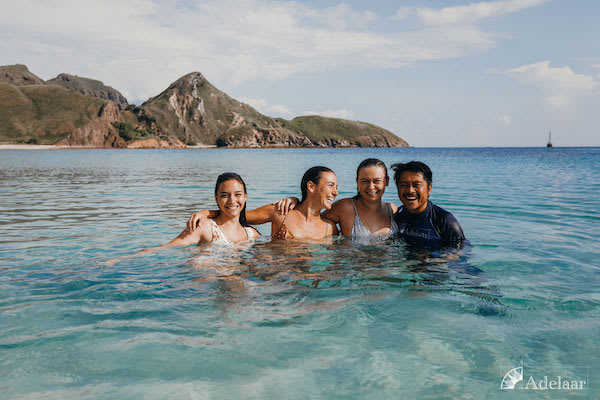
Lucipara Maisel Archipelago
Similar kind of diving to yesterday spoils us today. Apart from the chances to see pelagics other strong points of these dives are the general healthiness and sheer vastness of the reefs. Some of the walls and steep slopes are studded with luxuriant soft coral growth, in other parts the landscape is dominated by huge barrel sponges or immense sea fans. The shallows are mainly intact hard coral gardens inhabited by myriads of different species of reef fish.
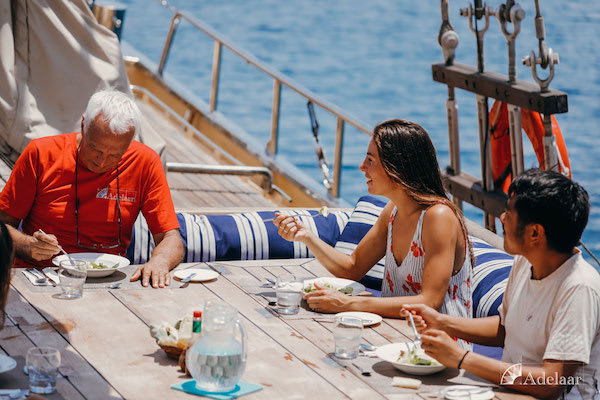
Gunung Api
Gunung Api means simply volcano in Indonesian. It is an old, lonely volcano that arises from the depth of the Banda sea. It attracts a huge colony of resident seabirds above the waves, while under water the island is home to schools of jacks, surgeonfish, tunas, barracudas and other pelagic fish species–as well as a lot of sea snakes. These venomous but unaggressive reptiles can be encountered on each dive around Gunung Api, sometimes in great numbers, which makes these dives absolutely unique.
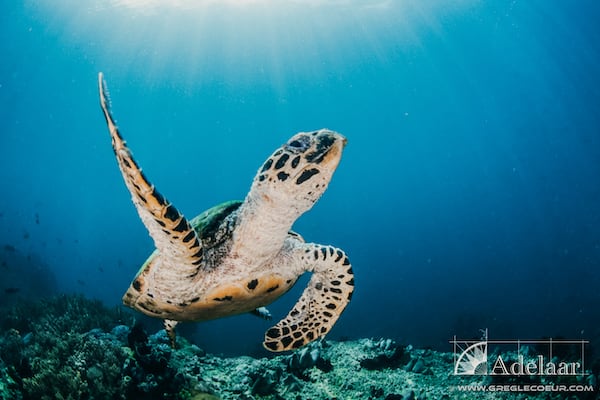
Wetar
During our last stop in the Moluccas, we are diving the walls and slopes of Reong and Wetar. Depending on the prevailing current they can be very rich in fish. Grey reef sharks, bamboo sharks, giant trevally, schooling big eyed jacks, rainbow runners and tunas are often seen here. On the quieter dives there are areas completely covered in zebra anemones. With a bit of luck, we may spot the beautiful but rare leopard shrimp that lives in symbiosis with them. We will set the sails as we start our crossing away from the Moluccas toward Alor and Nusa Tenggara Timur. With a bit of luck, we may see some of the whales that migrate through these waters during this time of the year.
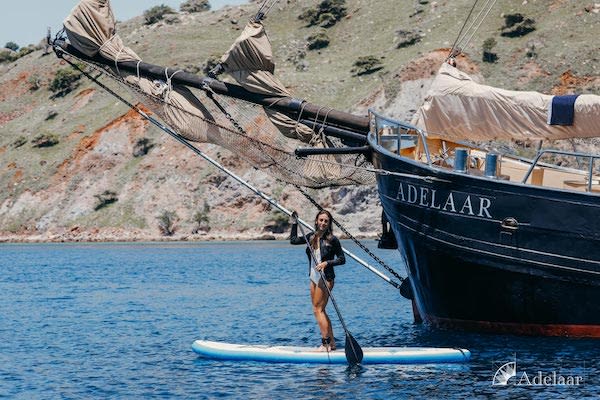
Pantar
Today’sfour dives in the scenically beautiful Pantar strait are distinctly different from one another: from an adrenalin filled dive with the objective to see schooling hammerhead sharks, and a second morning dive on a stunning wall that is covered so completely in soft corals that we might get a sensory overload, over an afternoon dive on a unique site that is covered in carpets of anemones and known for attracting mold molas and thresher sharks, to finally one of the richest black sand critter spotting night dives–it is really a day that demonstrates Indonesia's underwater richness in nutshell!
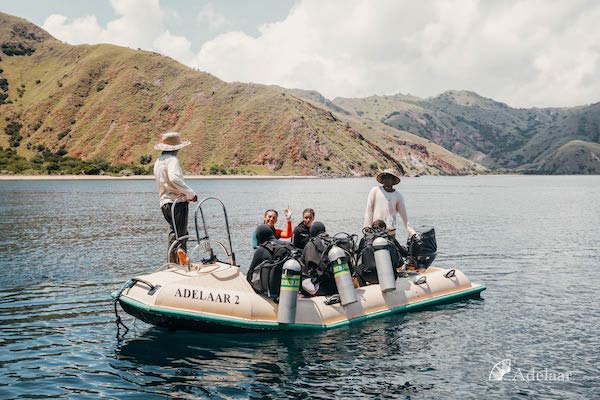
Beangabang
Hairy frogfish, mimic octopus, rhinopias, ambon scorpionfish, hairy octopus, thorny seahorse, hairy shrimp, Halimeda ghost pipefish are just a few stars we might be lucky enough to spot on the rich dark sands of Beangabang Bay in the South of Pantar. Another highlight will be the enthusiastic welcome we’ll get by the village kids when we go and let them guide us through their place.
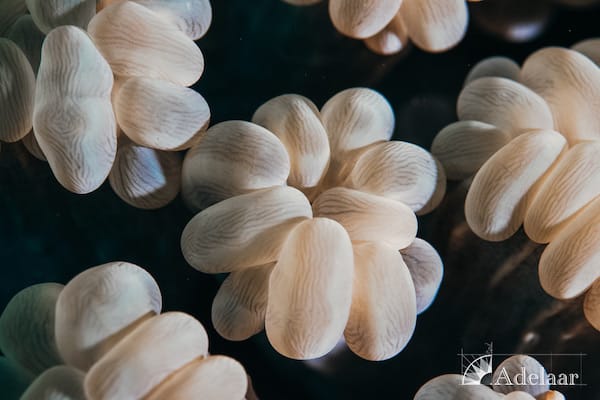
Alor Strait
The weather this time of the year typically provides good conditions to dive the exposed sites off the barren, dry south of the Alor archipelago. Apart from iconic huge soft coral ‘trees’ growing on the seafloor and profuse coral growth all around, we can expect a lot of pelagics, clouds of anthias and may even be lucky enough to meet mola molas or thresher sharks.
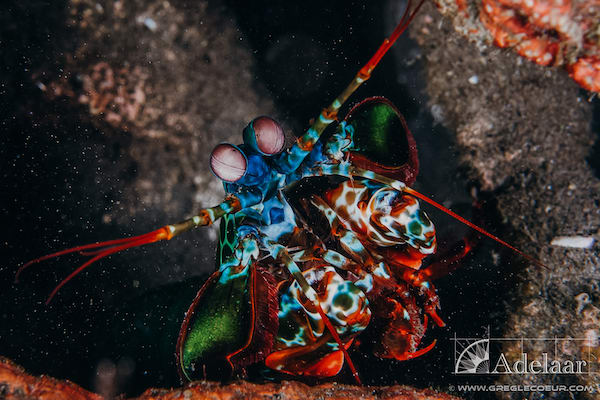
Boling Strait
Another chance to find some macro treasures! Critters hiding in the patch reefs and bright sandy substrates below the waters underneath the towering volcano Lewotolo include, but are not limited to, blue ring octopus, rough snout ghost pipefish, rhinopias, frogfish, tiger shrimp or wonderpus.
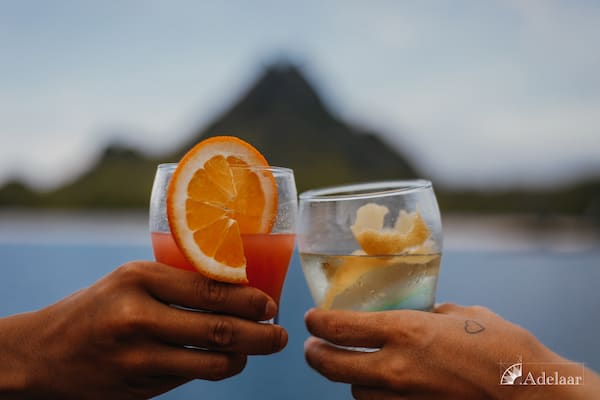
Adonara
The submerged seamounts off Adonara are covered by a diverse mix of hard and soft corals. They provide shelter for a variety of reef fish and attract bigger predators such as jacks, tunas, and black tip and grey reef sharks. Juvenile silvertip sharks are often seen patrolling the typically clear blue water. After the dive we cruise back into the sunset and arrive in Maumere at night for a farewell dinner.
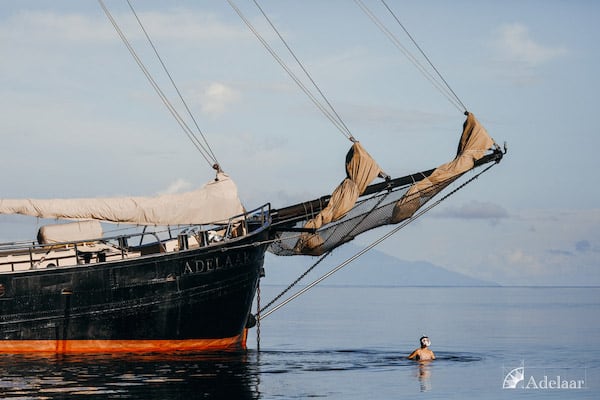
Disembarkation
After a last delicious breakfast, it is time to say goodbye and disembark - until the next time.
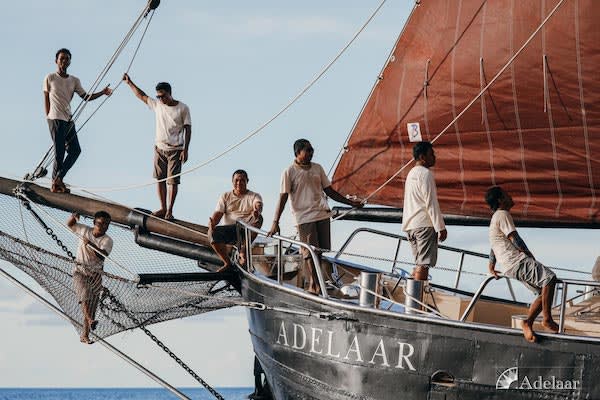
Embarkation
After boarding Adelaar in Serangan in the South of Bali, you will enjoy your first day on board whilst cruising along the Bali coast in the afternoon before crossing the Wallace line in the evening.
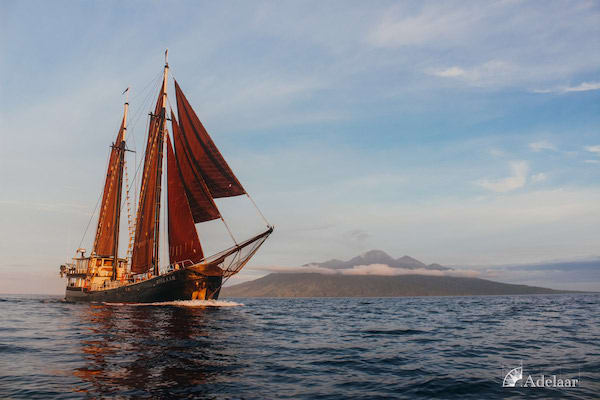
Moyo
Clear, warm water with lots of fish await you on the first day of diving on the seamounts off the island of Moyo. An optional village visit with a stroll to a nearby waterfall is also possible.
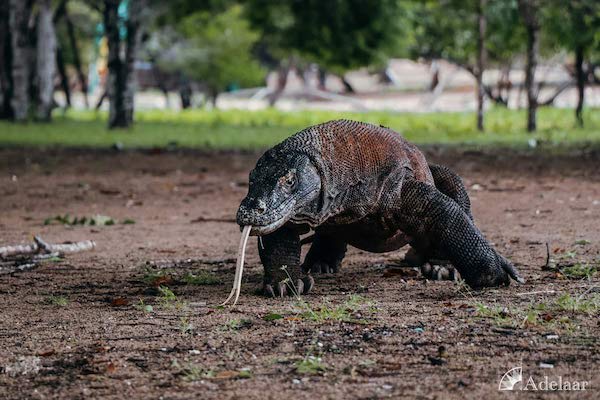
Sangeang
After a second night’s crossing, the critters inhabiting the colourful reefs of Sangeangs rich black sandy slopes are waiting to be discovered.
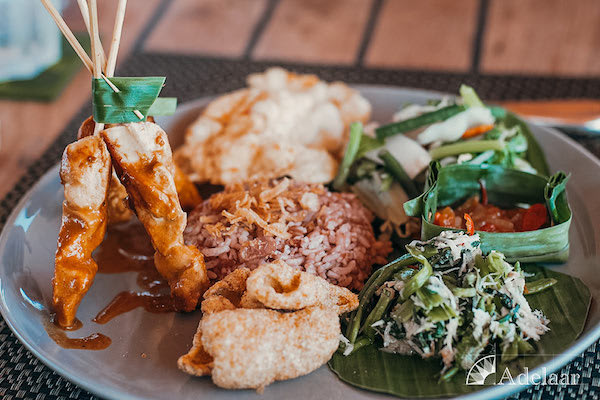
Banta
A completely different underwater landscape provides the setting for today’s underwater adventure. The hard coral formations on Banta's white sandy substrate are the home of a multitude of fish, turtles, sea snakes, reef sharks and the occasional eagle and manta rays.
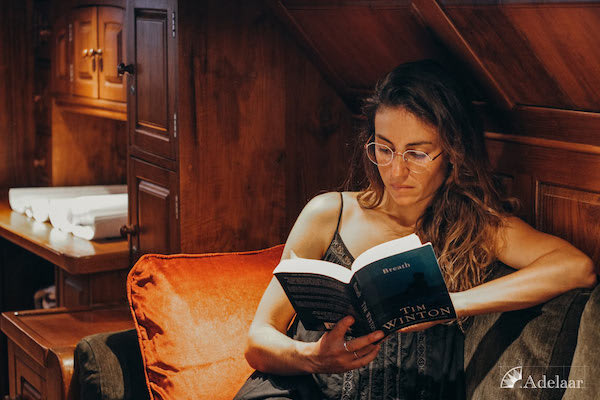
South Komodo
This whole day is dedicated to rays: during the day we check out ‘Manta Alley’, arguably one of the world’s best sites to observe the gentle giants–and in the evening we look for their smaller cousins, the elusive torpedo rays.
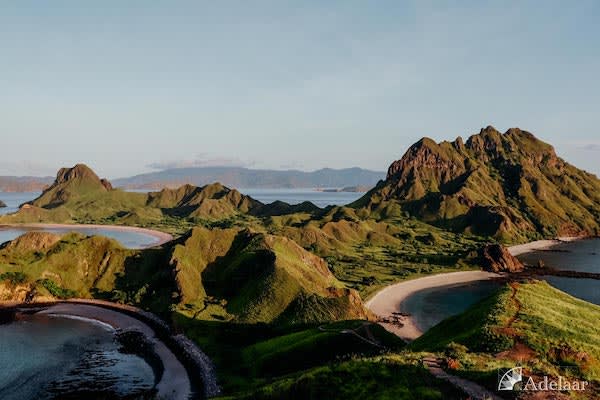
South Rinca
Extraordinarily healthy and unique reefs that shelter an abundance of weird and wonderful critters make this part of the Komodo national park a photographer’s dream.
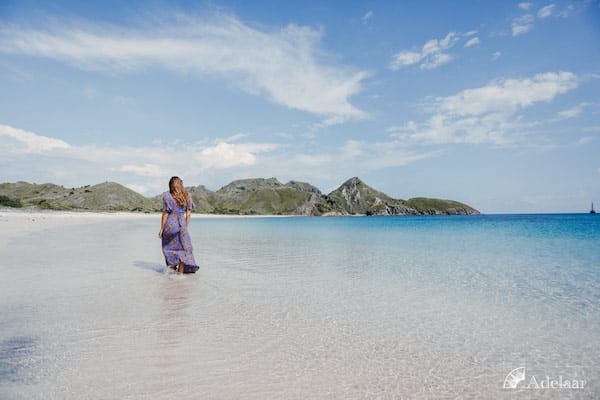
Central Komodo National Park
In the morning we visit the island of Rinca to spot some of the terrestrial wild life found in the park–with the komodo dragons as highlights. After the walk we’ll dive some of the action-packed sites of the central section of the park–stunning coral reefs bathed in a dazzling explosion of colourful fish life, that will make any diver beg for more of the same.
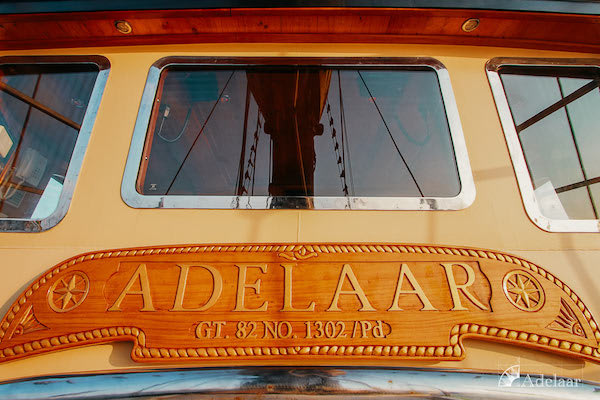
Gili Lawa
The seamounts and drift dives around the Gili Lawaislands in the northernmost part of the park are deservedly amongst the signature dive sites of the Komodo archipelago–a real diver’s dream. In the evening, the effort of climbing up to the view point will be rewarded with a glorious sunset over the whole national park.
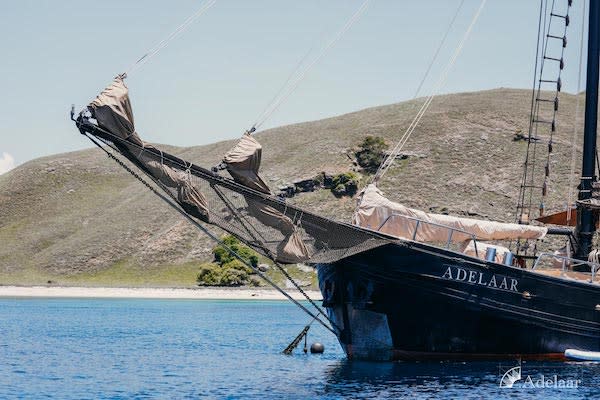
Tatawa
The constant current feeding the corals around the Tatawa islands makes sure that the surrounding reefs are as colorful as tropical reefs can get–an adequate setting for our last dives in the park.
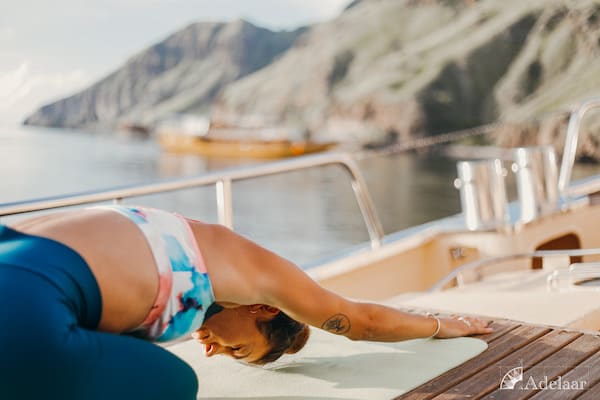
Palue
The steep walls of the volcanic Island Palue to the North of Central Flores are covered in soft corals and gorgonians–with a bit of luck we might even spot a pygmy seahorse or some of the rare nudibranchs found on these reefs. After the morning’s diving, we’ll pull up the sails and start the final stretch of our voyage.
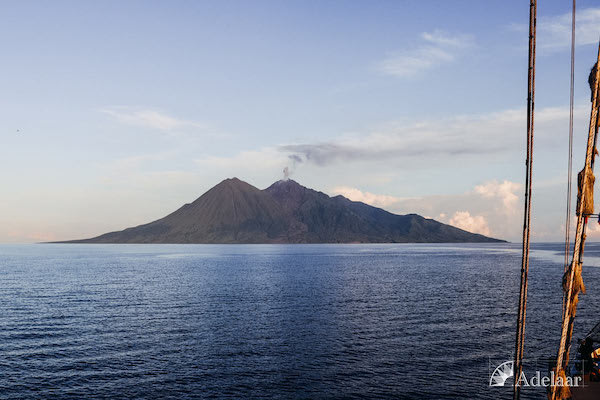
Disembarkation
After a last delicious breakfast, it is time to say goodbye and disembark - until the next time.
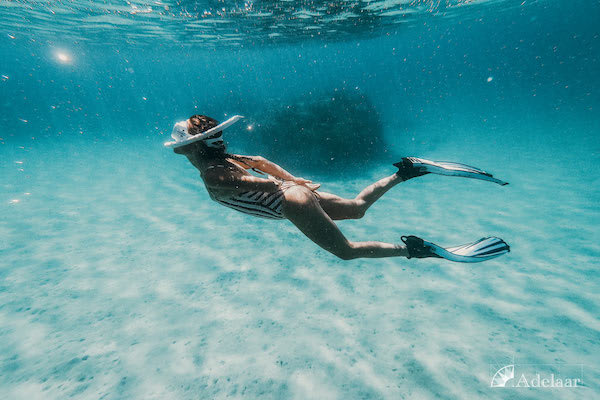
Embarkation
After boarding Adelaar in Ambon, you will enjoy your first day onboard whilst cruising straight into the heart of the blue Banda Sea.
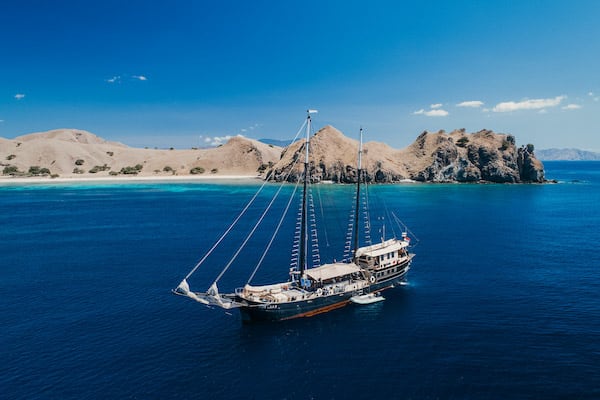
Ai & Gunung Api
Our first day of diving is along the steep walls surrounding the whole island of Ai. From a plateau with pretty hard coral gardens, these walls, beautifully decorated in yellow soft corals, plunge deep into the dark blue clear Banda Sea. With a bit of luck, we might already meet the first hammerhead shark of the trip. In the late afternoon, everybody will be on deck to witness the goosebump moment of arriving into one of the most spectacular and beautiful natural harbours in the world between the islands ofBanda Neira, Gunung Api and Lonthor (Banda Besar).
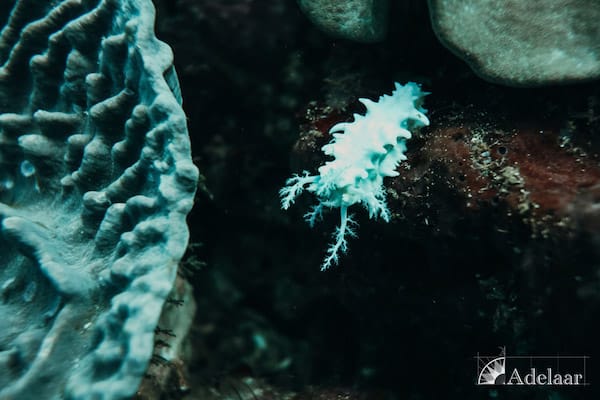
Banda Neira
After a guided visit to the historic town of Banda Neira, the fort, museum and spice plantations, we have traditional Bandanesebreakfast before strolling back to port through the bustling market of this lovely town. One of today’s dives is on a new reef that has been growing naturally on the spur of the lava from Gunung Apis1988 eruption–it is a fantastic example of nature’s ability to recover from a natural disaster. In the evening, we will dive at dusk to try and spot some romantic mandarin fish.
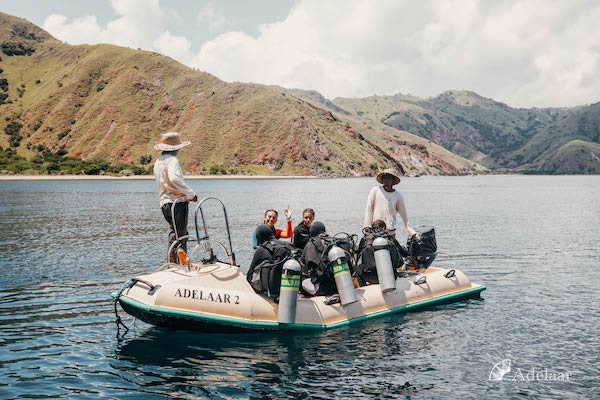
Banda Besar & Sjahrir
On today's menu is a spectacular submerged pinnacle covered in dense schools of fish and a couple of drift dives. The unique location of the Banda archipelago enhances chances of close encounters with pelagics such as big tunas, Spanish mackerels, giant jacks or even thresher sharks. In the evening we have a farewell dinner from Banda Neira in the tropical garden of a beautiful house from the colonial period.
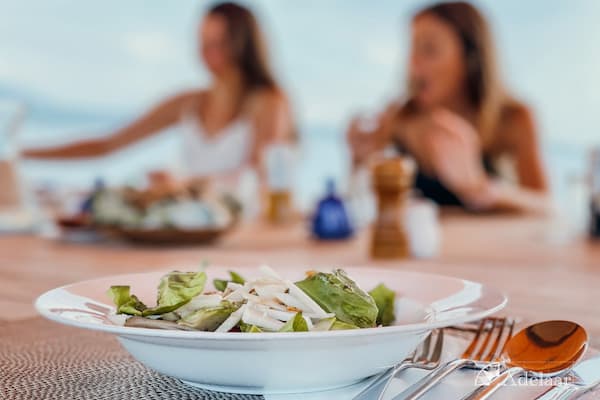
Hatta
The diving off Hatta, the easternmost Island of the Bandaarchipelago, named after Indonesia’s first vice-president, is our first day of diving dedicated to seeing schooling hammerhead sharks. The sight of groups ranging from a handful to literally hundreds of those majestic animals is an unforgettable experience–and one of the main reasons diving in the Banda Sea is so special.
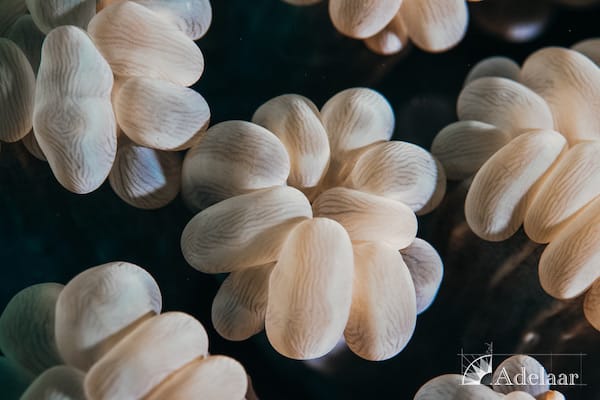
Manuk
Manuk - meaning bird in Javanese- is an old, lonely volcano that arises from the depth of the Banda sea. It attracts a huge colony of resident seabirds above the waves, while underwater the island is home to schools of jacks, surgeonfish, tunas, barracudas and other pelagic fish species–as well as a lot of sea snakes. These venomous but absolutely unaggressive reptiles can be encountered on each dive around Manuk, sometimes in great numbers, which makes these dives absolutely unique.
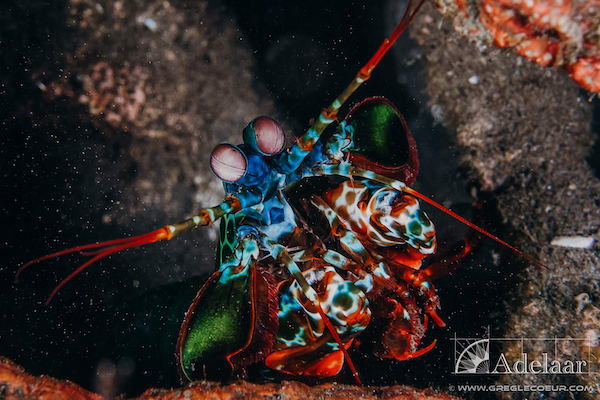
Sarua
There are no words that can do justice to the sheer awesomeness of the hammerhead site of Sarua. So we do not even try.
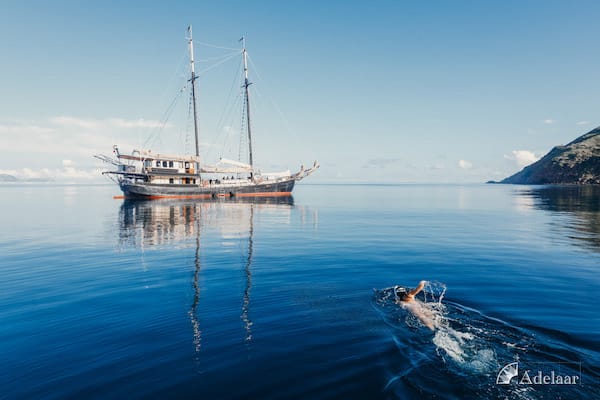
Sarua
One day would simply not be enough.
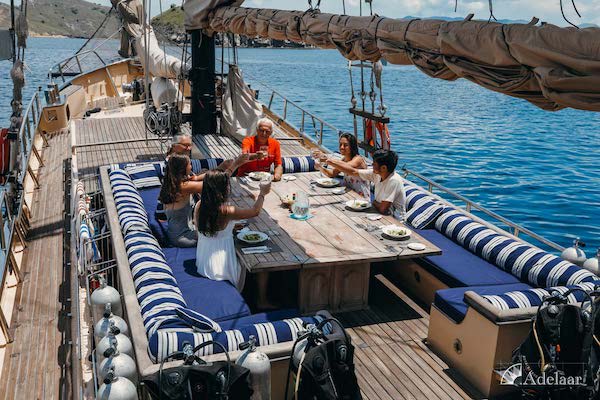
Run & Nailakka
Back in the Banda archipelago, we dive around Run, an island that used to be the most desirable piece of real estate in the whole world. So desirable that it was reluctantly and under a lot of pressure traded by the English to the Dutch against an undesirable piece of land on the other side of the world called Manhattan. Apart from its history, Run is beautiful–on the surface covered in nutmeg trees and under the water, the steep slopes are studded with huge gorgonian sea fans. It is yet another place that attracts schooling hammerhead sharks and other pelagics. We finish the day with a few drinks on the beach of Nailakka, the beautiful, but tiny island that was home to the English for several years after they lost Run to the Dutch.
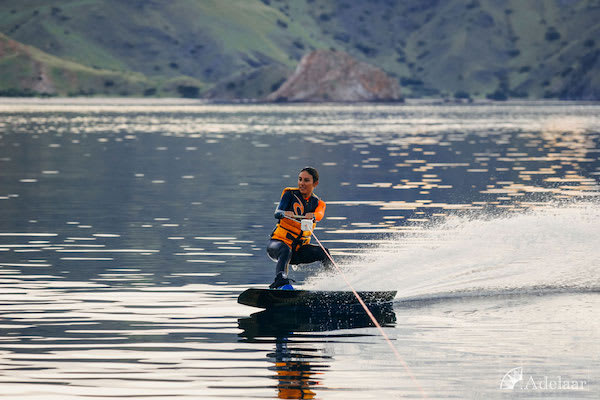
Manukang
On the way between Run and Ambon we stop for a couple of dives on a volcanic outcrop that is according to Moluccan lore known tobe haunted–this we cannot judge, but what we do know, is that it attracts its fair share of pelagic visitors that swim along its underwater ridges that are covered in huge barrel sponges. After the last dive, we set sails and start our trip back to reality.
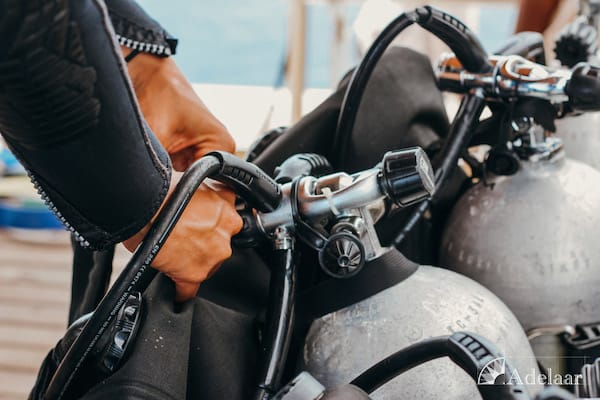
Disembarkation
After a last delicious breakfast, it is time to say goodbye and disembark - until the next time.
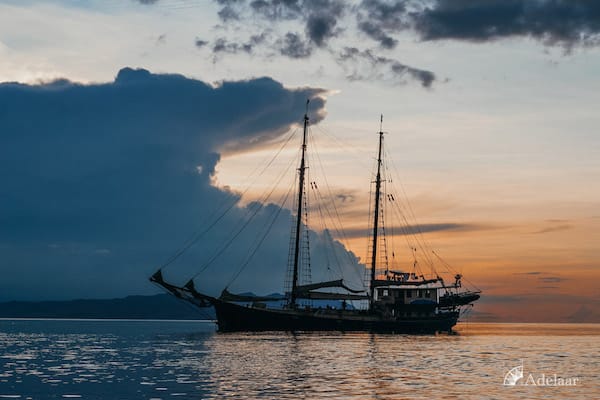
Accommodations
Social Areas
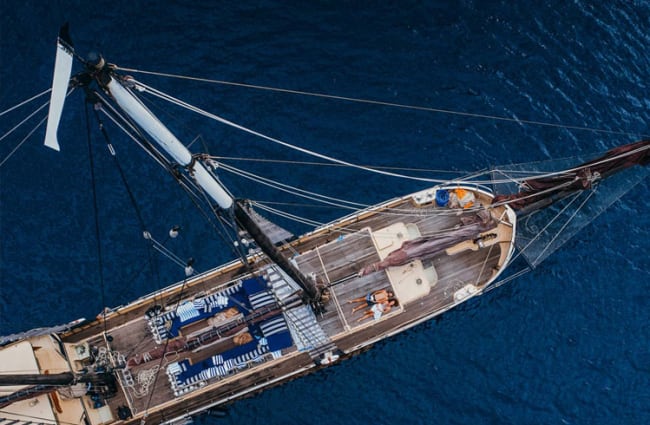
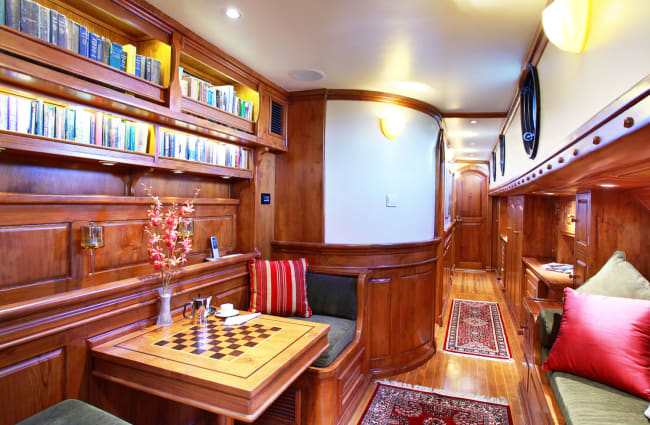
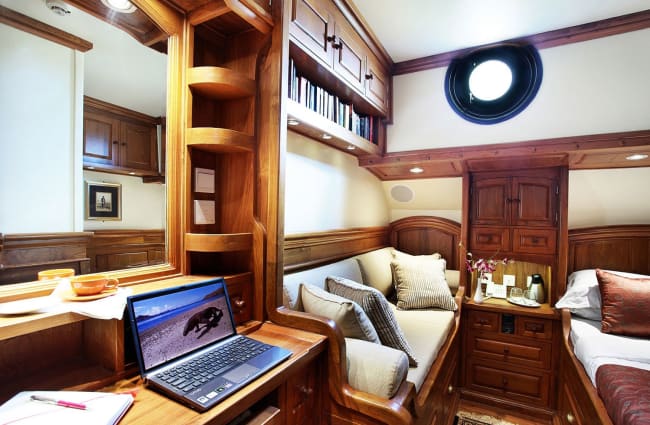
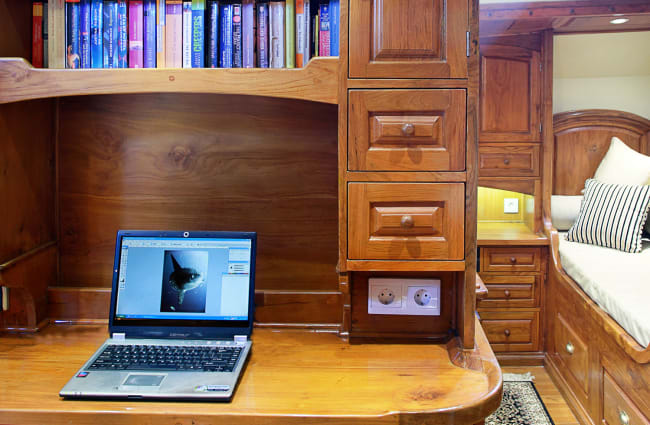
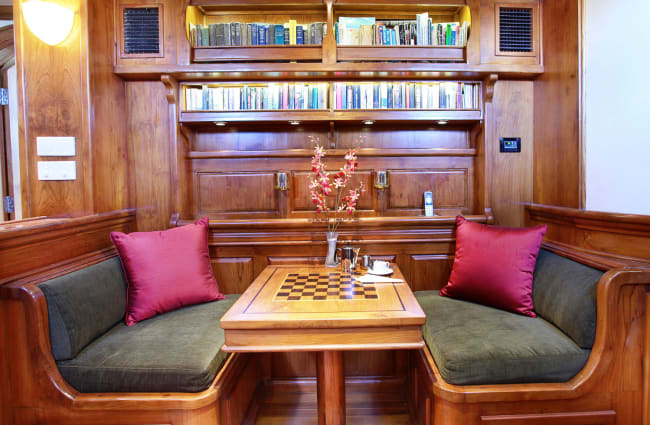
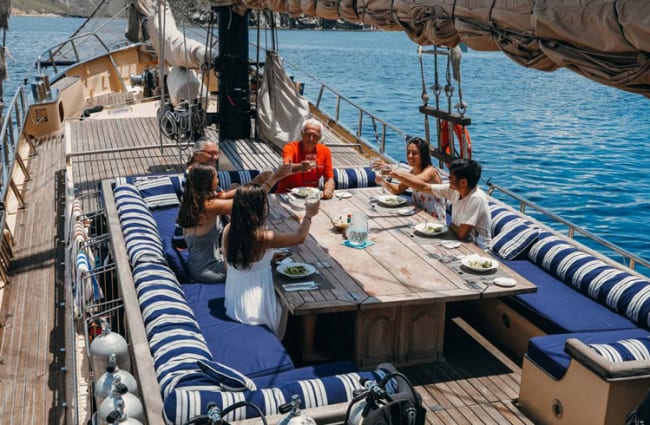

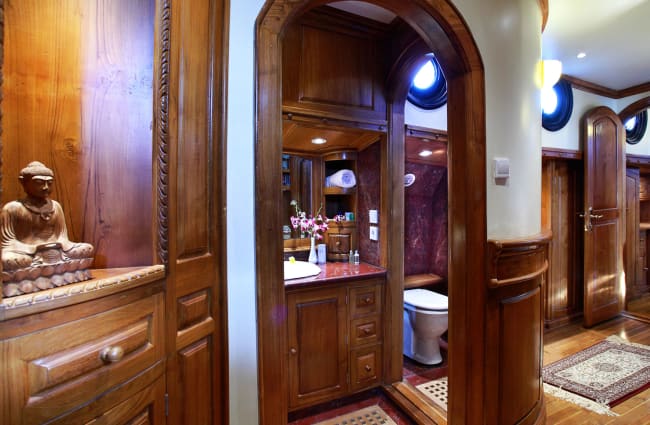
Suites & Cabins

Stateroom 4
Stateroom 4 features a slightly smaller double bed (198 x 128 cm), nightstand, closet, and some storage space, but no sofa is available. The ensuite bathroom is equipped with a vacuum toilet, a washbasin, a hot water shower, and branded amenities, including calming shampoo, body wash, and conditioner.




Staterooms 2 & 3
Both of the Staterooms 2 & 3 feature a double bed (200 x 140 cm) and sofa (200 x 70 cm) – which can convert into an extra bed for twin share – nightstand, closet, a desk, plenty of storage space and state-of-the-art entertainment system. The ensuite bathrooms are equipped with a vacuum toilet, a washbasin, a hot water shower, and branded amenities, including calming shampoo, body wash, and conditioner.





Master Suite
The Master Stateroom features a large double bed (207 x 160 cm), and no fewer than 2 nightstands, 2 closets, 2 desks, abundant storage space and state-of-the-art entertainment system. The ample sofa (207 x 70 cm) can convert into a bed for twin share or triple occupancy when sleeping a child. The ensuite bathroom is equipped with a vacuum toilet, a washbasin, a hot water shower, and branded amenities, including calming shampoo, body wash, and conditioner.
Related Cruises
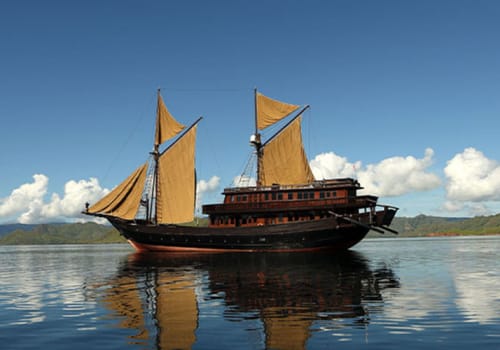
- Indonesia
Alila Purnama
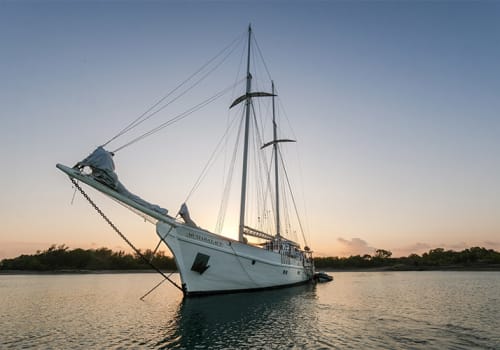
- Indonesia
Mutiara Laut
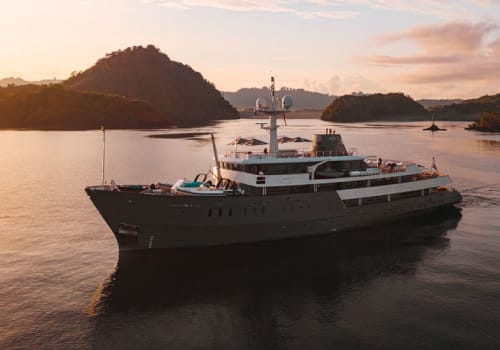
- Indonesia
Aqua Blu
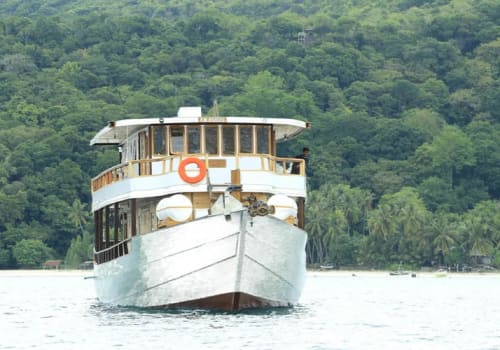
- Indonesia
Bajau
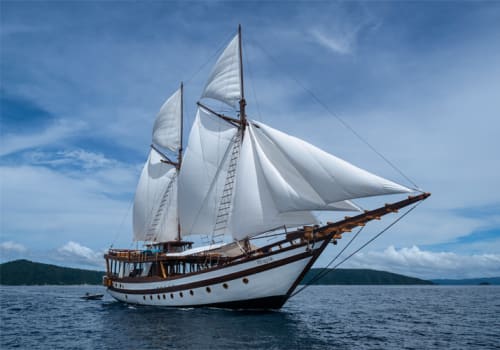
- Indonesia
Majik
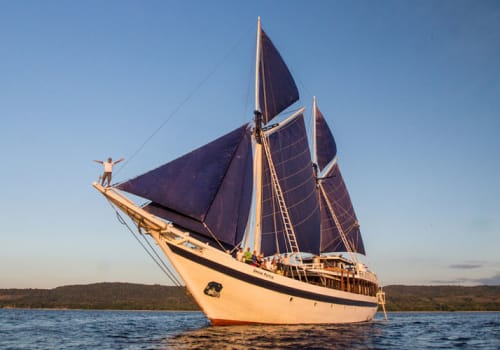
- Indonesia
Ombak Putih
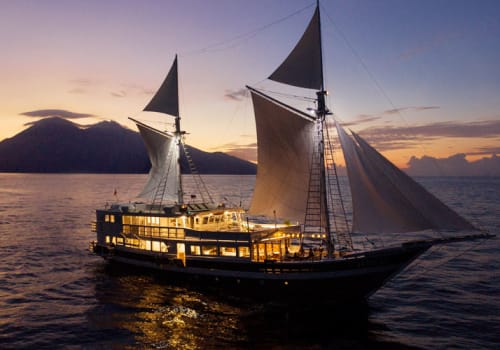
- Indonesia
Aliikai
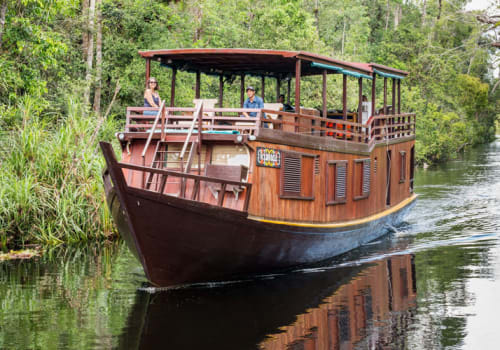
- Indonesia
Kumai
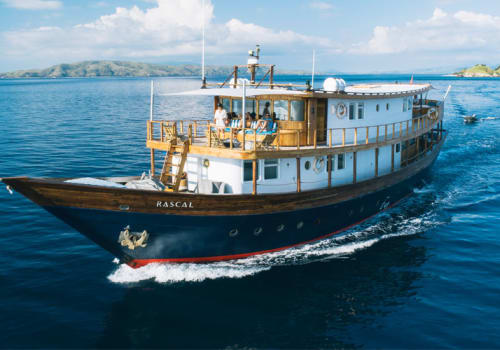
- Indonesia
Rascal
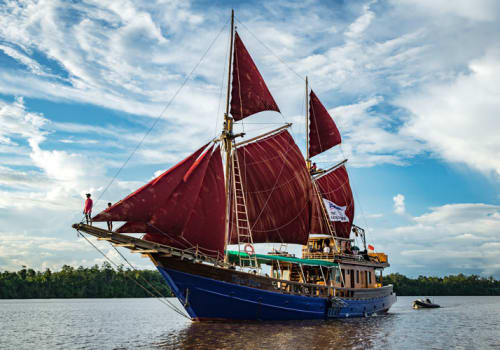
- Indonesia
Tiger Blue
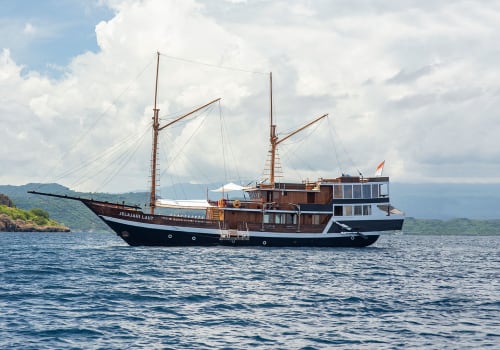
- Indonesia
Jelajahi Laut

- Indonesia
Bugis
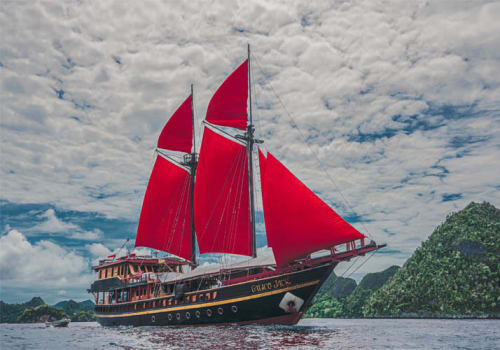
- Indonesia

